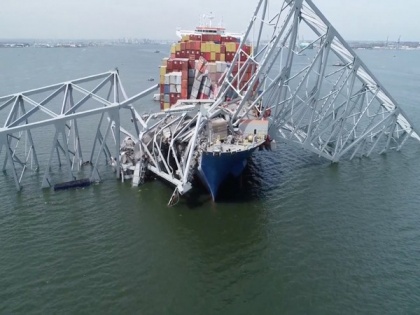Baltimore Bridge Collapse to impact coal-cobalt flow, disrupting trade at major US port
By ANI | Published: March 28, 2024 09:04 AM2024-03-28T09:04:26+5:302024-03-28T09:05:03+5:30
New Delhi [India], March 28 : The collapse of Baltimore's Francis Scott Key Bridge, following a collision with a ...

Baltimore Bridge Collapse to impact coal-cobalt flow, disrupting trade at major US port
New Delhi [India], March 28 : The collapse of Baltimore's Francis Scott Key Bridge, following a collision with a container ship early on March 26, has brought trade through the Maryland port to a grinding halt, causing significant disruptions to the flow of commodities, particularly coal and cobalt.
According to S&P Global Commodity Insights, the closure of the bridge, which serves as artery for the transportation of goods in and out of the Port of Baltimore, has led to the suspension of vessel traffic, severely impacting trade operations at one of the United States' key maritime hubs.
The bridge collapse has effectively blocked access to major US coal export terminals, including CSX Curtis Bay and Consol Marine Terminal (CNX), disrupting the flow of coal shipments.
Baltimore, as the top originating port for US thermal coal exports, faces a substantial setback, with approximately 17.1 million metric tons of thermal coal exported from the port in 2023 alone.
Furthermore, the closure is expected to impede US coal exports to key destinations such as India, China, Canada, and the Netherlands, with Baltimore handling a significant portion of these shipments.
Primary shippers of coal from Baltimore, including Arch Resources, Consol, and XCoal, among others, are likely to face logistical challenges as alternative routes may not provide sufficient capacity to compensate for the disruption.
While some of the impacted coal tonnage may be diverted to terminals in Hampton Roads, Virginia, industry experts anticipate short-term disruptions in Baltimore coal exports, albeit with limited pricing impacts due to well-stocked markets.
Baltimore's significance in the metals trade is also underlined by the disruption, particularly in cobalt imports. The port serves as the largest source of US cobalt imports, with over half of total shipments flowing into Baltimore in 2023.
The closure has halted cobalt shipments, leading to tight inventories and a halt in spot cobalt offerings in the US.
Moreover, Baltimore's ports were the third-largest destination for US imports of unwrought primary aluminum in 2023, further exacerbating the impact on metals trade.
Shipments of tin, copper, zinc, and lead are also expected to face delays, affecting supply chains and market dynamics.
Bulk ferrous scrap exports from Baltimore terminals in 2023 witnessed a significant increase, with the collapse likely to impede further shipments.
Additionally, the closure may affect exports of LDPE film bales, albeit representing a small portion of total US scrap plastic ethylene derivative exports.
While the bridge collapse has had little impact on US refined products flows and prices, bunker supplies on the Atlantic Coast could tighten as vessels seek alternative refuelling ports.
Furthermore, the closure is likely to necessitate the shifting of container traffic to other area ports, including those in New York, New Jersey, and Norfolk, Virginia, adding complexities to shipping operations.
Across various commodities, price reactions have been observed. While coal prices remained relatively stable, cobalt prices saw an uptick following the disruption.
Similarly, aluminium transaction premiums reached a five-month high, reflecting market uncertainties and supply chain disruptions.
Disclaimer: This post has been auto-published from an agency feed without any modifications to the text and has not been reviewed by an editor
Open in app